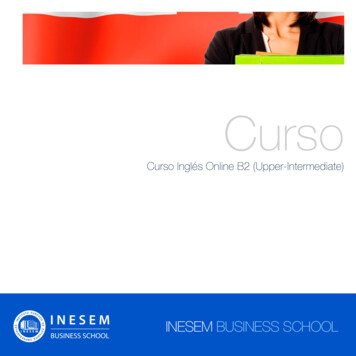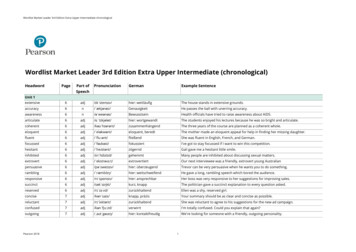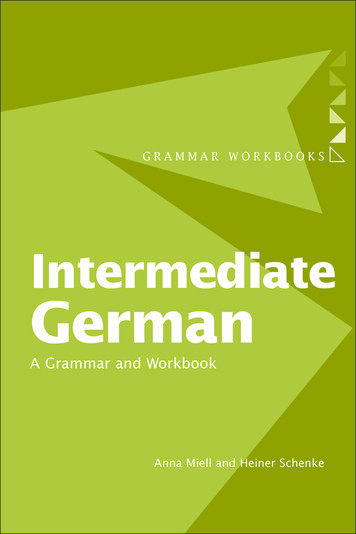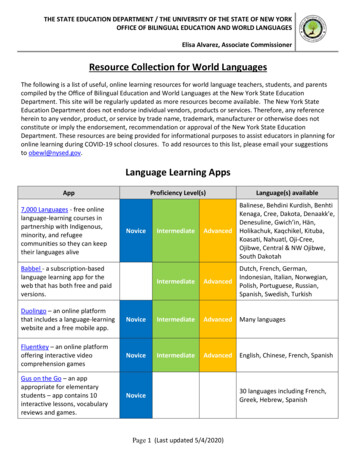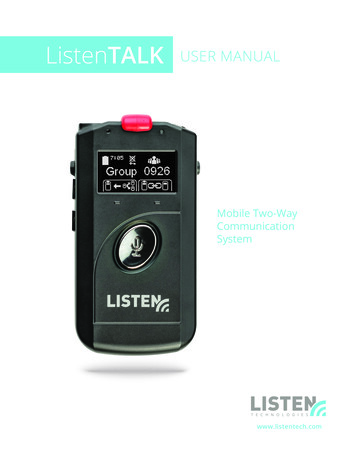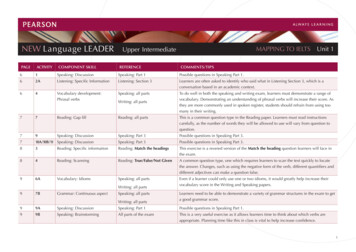
Transcription
NEW Language LEADERPAGEACTIVITYCOMPONENT SKILLMAPPING TO IELTSUpper IntermediateREFERENCEUnit 1COMMENTS/TIPS61Speaking: DiscussionSpeaking: Part 1Possible questions in Speaking Part 1.62AListening: Specific InformationListening: Section 3Learners are often asked to identify who said what in Listening Section 3, which is aconversation based in an academic context.64Vocabulary development:Phrasal verbsSpeaking: all partsTo do well in both the speaking and writing exam, learners must demonstrate a range ofvocabulary. Demonstrating an understanding of phrasal verbs will increase their score. Asthey are more commonly used in spoken register, students should refrain from using toomany in their writing.Writing: all parts77Reading: Gap fillReading: all partsThis is a common question type in the Reading paper. Learners must read instructionscarefully, as the number of words they will be allowed to use will vary from question toquestion.79Speaking: DiscussionSpeaking: Part 3Possible questions in Speaking Part 3.710A/10B/11 Speaking: DiscussionSpeaking: Part 3Possible questions in Speaking Part 3.83Reading: Specific informationReading: Match the headingsThis exercise is a revered version of the Match the heading question learners will face inthe exam.84Reading: ScanningReading: True/False/Not GivenA common question type, one which requires learners to scan the text quickly to locatethe answer. Changes, such as using the negative form of the verb, different quantifiers anddifferent adjectives can make a question false.96AVocabulary: IdiomsSpeaking: all partsEven if a learner could only use one or two idioms, it would greatly help increase theirvocabulary score in the Writing and Speaking papers.Writing: all parts97BGrammar: Continuous aspectSpeaking: all partsWriting: all partsLearners need to be able to demonstrate a variety of grammar structures in the exam to geta good grammar score.99ASpeaking: DiscussionSpeaking: Part 1Possible questions in Speaking Part 1.99BSpeaking: BrainstormingAll parts of the examThis is a very useful exercise as it allows learners time to think about which verbs areappropriate. Planning time like this in class is vital to help increase confidence.1
NEW Language LEADERPAGEACTIVITYCOMPONENT SKILLMAPPING TO IELTSUpper IntermediateREFERENCEUnit 1COMMENTS/TIPS910ASpeaking: DiscussionSpeaking: Part 3Another scaffolding exercise, which gives learners topics to focus on. This is vital becauseoften learners struggle, not with the language but with thinking of something to say,especially in Part 3 of the Speaking paper.910BSpeaking: ConsequencesSpeaking: Part 3Demonstrating consequences is important if a learner wishes to give a fill answer.107BReading: Specific informationReading: who said whatA possible question type in the exam, one which requires learners to use scanningtechniques to locate the author’s name. They will then need to read the sentencessurrounding the name, to establish who said what.118AReading: Specific informationReading: all parts1110A/BVocabulary development:CollocationsSpeaking: all partsWriting: all partsDemonstrating an awareness of collocations can greatly increase a learner’s vocabularyscore.122Listening: Specific informationListening: Section 3123A/3B/3C/3DVocabulary development:Outlining problems,offering solutions and reactingto suggestionsSpeaking: Part 3This exercise contains useful language learners will need to help them fully answerSpeaking Part 3 questions.124Speaking: DiscussionSpeaking: Part 3Learners will be asked to offer solutions to questions in Speaking Part 3.142AStudy Skills: Note takingListening: Section 4It is good for learners to understand how lecture notes work because in Listening Section4, they are often asked to complete gap fill questions from lecture notes.2
NEW Language LEADERPAGEACTIVITYCOMPONENT SKILLMAPPING TO IELTSUpper IntermediateREFERENCEUnit 2COMMENTS/TIPS162Listening Specific informationListening: Section 3The table format presented here is similar to one learners could face in the exam.163Vocabulary development: TheenvironmentSpeaking: all partsThis is a common topic in the exam. To score well in vocabulary, learners will need toshow a range of vocabulary related to the topic.Writing: all parts175Speaking: DiscussionSpeaking: Part 3The environment is a common topic in the exam. This exercise is helpful as it gives leanersthe most common environmental issues, helping to scaffold their learning.181Speaking: Discussing/ justifyingSpeaking: Part 3Possible questions in Speaking Part 3.182Vocabulary development:DefinitionsReading: all partsLearners need a range of vocabulary to do well in the IETLS reading paper. Any readingshould be used to help increase a learner’s vocabulary range.183Reading: Understanding themain ideaReading: Match the headings186Speaking: DiscussionSpeaking: Part 3Possible questions in Speaking Part 3.197A/7B/8Grammar: Present perfect simpleand Present perfect continuousSpeaking: all partsA range of grammar is required to do well in the Speaking and Writing exam.Writing: all parts205A/5C/6A Grammar: Indirect questionsSpeaking: all parts207Reading: SkimmingReading: all partsA vital skill for the reading paper as learners will not have enough time to read all threetexts in detail. They will need to skim to help them understand the main idea of the text.209Vocabulary development:AdverbsSpeaking: all partsLike adjectives, adverbs can greatly add to one’s descriptive power when speaking. If usedeffectively, they can improve a learner’s vocabulary score.213A/3BVocabulary development:Speaking: all partsAgreeing and disagreeing politelyListening: Section 1 and 3Listening: Section 1 and 3Writing: all partsIndirect questions may appear in the listening paper but they may also be used by theexaminer in the speaking exam, especially in Part 3.Language like this may appear in the Listening paper but learners may also need to use itin the Speaking paper, especially in Part 3, when they are engaged in a discussion with theexaminer.1
NEW Language LEADERPAGEACTIVITY26226326COMPONENT SKILLMAPPING TO IELTSUpper IntermediateREFERENCEUnit 3COMMENTS/TIPSSpeaking: Discussing/JustifyingReading: Understanding themain ideaSpeaking: Part 1Possible questions in Speaking Part 1.Reading: Match theheadings4Reading: ScanningReading: True/False/NotGiven27327428728288Listening: Understanding the Listening: Section 4main ideaListening: SpecificListening: Section 4informationReading: ScanningReading: True/False/NotGivenReading: ScanningReading: Multiple choiceVocabulary development:Speaking: all parts-self, abstract nounsWriting: all partsGrammar: QuantifiersSpeaking: all partsA common question type in the Reading paper. Learners should read the firstsentence and the last sentence of each paragraph to help them answer thisquestion.A common question type, one which requires learners to scan the text quicklyto locate the answer. Changes, such as using the negative form of the verb,different quantifiers and different adjectives can make a question false.While this is not a question learners will get in the exam, it is good practice toimprove their general Listening skills.282814301302Writing: Freer practiceSpeaking: Discussing/SpeculatingReading: SkimmingWriting: all partsSpeaking: all partsWriting: all partsSpeaking: Part 2 (Long turn)By using language like this, learners will demonstrate their range and increasetheir Vocabulary score.A key grammar point, one which learners will need to use throughout theSpeaking and Writing exam.This is a useful exercise as it gives learners time to think about topics beforethe exam. Often having ideas is the most challenging part for IELTS learners.A possible Speaking Part 2 question.Reading: all parts1
NEW Language LEADERPAGEACTIVITYCOMPONENT SKILLREFERENCE304Reading: InferringReading: all parts317a/7b/8Grammar: ArticlesSpeaking: all parts319Pronunciation: Weak formof ‘the’Writing: all partsListening: all partsSpeaking: all parts3110aSpeaking: DiscussingSpeaking: Part 3335a/6Vocabulary development:Using emphasis andcomparisonSpeaking: Giving apresentationSpeaking: all partsWriting: Understandingessay questionsListening: SpecificinformationReading: OrderinginformationWriting: IntroductionsWriting: Task 2337a/7b/8a342a/2b343b357358aMAPPING TO IELTSUpper IntermediateWriting: all partsSpeaking: Part 2 (Long turn)Listening: Section 4Writing: For and againstessayWriting: Task 2Unit 3COMMENTS/TIPSThis is the question type learners have the most trouble with. They tend tolook for answers which clearly appear in the text. Inference requires learnersto read more of the paragraph in order to understand the writer’s point ofview.One of the most challenging grammar points for learners. Using articlescorrectly can greatly improve the accuracy of a learner’s speaking and writing.It is key to raise awareness of pronunciation features in order to help learnerswith the Listening paper. It is also important that learners try to produce someof these features in the Speaking exam, if they wish to get a good score forpronunciation.Possible Speaking Part 3 questions. This exercise is helpful as it scaffoldslearning by providing adjectives which the learners should use.This exercise demonstrates the importance of vocabulary to help get one’spoint across. Producing sentences like those in question 6 is very impressive.Although presented here as a presentation, the topic could be a Speaking Part2 question. 7b requires learners to make notes, as required in the exam. 8acould be altered easily into Speaking Part 2 practice rather than deciding whowould present.A great exercise helping learners deal with essay questions.Presented in the format of Listening Section 4 and a useful topic, teachinglearners about essay writing.This exercise shows the format of a For and Against essay.This exercise examines the components of an introduction.2
NEW Language LEADERPAGEACTIVITY35359a103511aCOMPONENT SKILLWriting: IntroductionsVocabulary development:Formal expressionsSpeaking: DiscussingMAPPING TO IELTSUpper IntermediateREFERENCEWriting: Task 2Writing: Task 2Writing: Task 2Speaking: Part 3Unit 3COMMENTS/TIPSUseful expressions on how to start your introduction.Introducing the importance of register and giving learners useful expressionsthey can use in their essays.A useful brainstorming exercise, allowing learners to generate some ideas fortheir essays and replies in Speaking Part 3.3
NEW Language LEADERPAGEACTIVITY362364A/4B37COMPONENT SKILLListening: SpecificinformationVocabulary development:Medical termsREFERENCEUnit 4COMMENTS/TIPSListening: all partsSpeaking: all partsWriting: all partsListening: all partsThis is a common topic in the exam. To score well in vocabulary, learners willneed to show a range of vocabulary related to the topic.Speaking: Part 3Listening: Section 4Listening Section 4 is an academic lecture.6Speaking: Discussing/JustifyingListening: SpecificinformationReading: ScanningIt is key to raise awareness of pronunciation features in order to help learnerswith the Listening paper. It is also important that learners try to produce someof these features in the Speaking exam, if they wish to get a good score forpronunciation.Possible questions in Speaking Part 3.Reading: all partsThis is a vital skill in the reading paper as learners do not have enough time toread all three texts. Scanning allows them to locate answers in the text morequickly.387Reading: Scanning388399Speaking: Discussing/JustifyingVocabulary development:Illness and medicineReading: True/False/NotGivenSpeaking: Part 33910537938238Pronunciation: StressedsyllablesMAPPING TO IELTSUpper IntermediateGrammar: Futurecontinuous/ going to /present continuousSpeaking: all partsSpeaking: all partsWriting: all partsSpeaking: all partsWriting: all partsPossible questions in Speaking Part 3.This is a common topic in the exam. To score well in vocabulary, learners willneed to show a range of vocabulary related to the topic.Variety is key to a good grammar score. Speaking about the future by usingvarious grammar points, will increase a learner’s score.1
NEW Language LEADERPAGE4ACTIVITY5A/5B/6A40COMPONENT SKILLREFERENCEVocabulary development:Dependant prepositionsSpeaking: all partsGrammar: Future perfectsimple and Future simpleSpeaking: all partsWriting: all partsWriting: all partsWriting: all parts4010Writing: Controlled practice414112Reading: ScanningReading: ScanningReading: all partsReading: Match theheadings422Vocabulary development:Discussing implicationsSpeaking: all parts13433A4512Vocabulary development:Discussing implicationsVocabulary development:Making recommendationsMAPPING TO IELTSUpper IntermediateUnit 4COMMENTS/TIPSA challenging vocabulary point for learners, one which they need a lot ofpractice. Used effectively they can greatly increase a learner’s vocabularyscore.Variety is key to a good grammar score. Speaking about the future by usingvarious grammar points, will increase a learner’s score.Exercises like this are necessary as they focus on accuracy, a key point in theIELTS exam, but one which is often neglected over fluency.This exercise is a variation of the Match the heading question learners will getin the exam, but it is still useful practice to help learners locate the main ideasin the text.Useful vocabulary to help learners explain their point.Writing: all partsSpeaking: all partsWriting: all partsWriting: Task 2Learners are frequently asked to make recommendations in essays, especiallyProblem and Solution essays.2
NEW Language LEADERPAGE46ACTIVITY4ACOMPONENT SKILLMAPPING TO IELTSUpper IntermediateREFERENCEVocabulary development:TransportSpeaking: all partsWriting: all partsCOMMENTS/TIPSThis is a common topic in the exam. To score well in vocabulary, learners will need toshow a range of vocabulary related to the topic.476Speaking: DiscussionSpeaking: Part 1Possible questions in Speaking Part 1.477ASpeaking: JustifyingSpeaking: Part 3A useful exercise as it scaffolds a learner’s answer.478Reading: ScanningReading: all parts4710AVocabulary development: SafetyfeaturesSpeaking: all partsWriting: all partsUnit 5This is a common topic in the exam. To score well in vocabulary, learners will need toshow a range of vocabulary related to the topic.4710BSpeaking: Discussing/ JustifyingSpeaking: Part 3484Reading: SkimmingReading: all partsThis is a vital skill in the Reading paper as learners do not have enough time to read allthree texts. Skimming allows them to understand the main ideas of the text more quickly.482Listening: Specific informationListening: all partsWhile True/False/Not Given questions do not appear in the listening paper, this exercisehelps to focus a learner’s attention on verb form, adjectives and the adverbs used inquestions.498A/8B/8C Vocabulary development:CollocationsSpeaking: all partsCollocations are essential, if a learner wishes to get a good score for vocabulary.499/10Grammar: Modal verbs – ability,possibility and obligation (future)Speaking: all partsWriting: all partsWriting: all parts502Reading: ScanningReading: all parts503Reading: ScanningReading: all parts517A/7B/7C Grammar: Ability, possibility andobligation (past)Speaking: all partsWriting: all partsModal verbs are a key grammar point in IELTS. Learners will need to use them throughouttheir speaking and writing exams and must therefore be able to use them flexibility andwith accuracy.This is a vital skill in the Reading paper as learners do not have enough time to read allthree texts. Scanning allows them to locate answers in the text more quickly.Modal verbs are a key grammar point in IELTS. Learners will need to use them throughouttheir speaking and writing exams and must therefore be able to use them flexibility andwith accuracy.1
NEW Language LEADERPAGE51ACTIVITY8COMPONENT SKILLGrammar: Controlled practiceMAPPING TO IELTSUpper IntermediateREFERENCESpeaking: all partsWriting: all partsUnit 5COMMENTS/TIPSExercises like this help focus a learner’s attention to the accuracy required for the IELTSexam. Accuracy is often overshadowed by fluency in the exam but learners need both inorder to do well.519ASpeaking: MonologueSpeaking: Part 2 (long turn)Possible Speaking Part 2 question.521Speaking: Explaining your pointSpeaking: Part 1Possible Speaking Part 1 questions.524Speaking: Discussing / Explaining Speaking: Part 3you pointPossible Speaking Part 3 questions.541Writing: Types of graphsWriting: Task 1A useful exercise showing learners the different ways data may be presented in the exam.543AWriting: Understanding dataWriting: Task 1This exercise exposes learners to some of the key language they will need to use in WritingTask 1.554BVocabulary development:Comparison and contrastWriting: Task 1This exercise exposes learners to some of the key language they will need to use in WritingTask 1.555/6Writing: Understanding dataWriting: Task 1A scaffolding exercise helping learners to understand data.557Writing: Freer practiceWriting: Task 1In the exam, learners need to write a minimum of 150 words for Writing Task 1.2
NEW Language LEADERPAGE56ACTIVITY1COMPONENT SKILLMAPPING TO IELTSUpper IntermediateREFERENCEVocabulary development: Genres Speaking: all partsWriting: all partsUnit 6COMMENTS/TIPSThis is a common topic in the exam. To score well in vocabulary, learners will need toshow a range of vocabulary related to the topic.562Speaking: DiscussionSpeaking: Part 1Possible questions in Speaking Part 1.564Reading: Inferring meaningReading: all partsInference is a key problem area for many learners as they tend to look for concreteanswers in the text. Inference often requires learners to read more of the paragraph inorder to understand the writer’s point of view.571Vocabulary development:Literature and filmSpeaking: all partsThis is a common topic in the exam. To score well in vocabulary, learners will need toshow a range of vocabulary related to the topic.Writing: all parts578aListening: Specific informationListening: Section 3 (Who saidwhat)This is a common question type in Listening Section 3.578bListening: Specific informationSpeaking: all partsThis exercise contains key language learners should use when describing literature or film.Writing: all parts585Listening: Specific informationSpeaking: all partsThis exercise contains key language learners should use when describing literature or film.Writing: all parts58, 599a/10/11a/ Grammar: Narrative tenses11b/11c/12Speaking: Part 2 (Long turn)Leaners are often asked to retell an event in Speaking Part 2; making narrative tenses a keycomponent of the exercise.603Reading: Understanding themain ideaReading: SummaryIt is important that learners scan the text to understand the main ideas. A summaryquestion may cover the whole text or only part of one.617a/7bVocabulary development:Vocabulary from the textReading: all partsLearners need a range of vocabulary to do well in the IELTS Reading paper. Any readingshould be used to help increase a learner’s vocabulary range.619Listening: Specific informationListening: all partsThe instructions for this exercise tell the learner how many words they can use to answerthe question. This is a common feature in the IELTS Listening paper that learners need tobe aware of because the number of words used changes from question to question.1
NEW Language LEADERPAGE6161ACTIVITYCOMPONENT SKILLREFERENCE10a/10b/11 Grammar: Used to / would getused toSpeaking: all parts14Listening: all partsPronunciation: Used toWriting: all partsSpeaking: all parts6512/13Vocabulary development:Adjectives, AdverbsMAPPING TO IELTSUpper IntermediateSpeaking: all partsWriting: all partsUnit 6COMMENTS/TIPSLeaners are often asked to comment or talk about the past, making this an essentialgrammar point for learners.It is key to raise awareness of pronunciation features in order to help learners with theListening paper. It is also important that learners try to produce some of these features inthe Speaking exam, if they wish to get a good score for pronunciation.Learners need to have a variety of adjectives and adverbs they can use in order todemonstrate range.2
NEW Language LEADERPAGEACTIVITYCOMPONENT SKILLMAPPING TO IELTSUpper IntermediateREFERENCEUnit 7COMMENTS/TIPS661Speaking: DescribingSpeaking: Part 2 (Long turn)Possible Speaking Part 2 question662A/2BVocabulary development:Describing buildingsSpeaking: all partsThis is a common topic in the exam. To score well in vocabulary, learners will need toshow a range of vocabulary related to the topic.Pronunciation: Word stressListening: all parts663Writing: all partsSpeaking: all parts675AVocabulary development: Verbsdescribing buildingsSpeaking: all partsWriting: all partsIt is key to raise awareness of pronunciation features in order to help learners with theListening paper. It is also important that learners try to produce some of these features inthe Speaking exam, if they wish to get a good score for pronunciation.This is a common topic in the exam. To score well in vocabulary, learners will need toshow a range of vocabulary related to the topic. This vocabulary is especially useful inWriting Task 1 map questions, which often show how an area/building has changed overtime.676AReading: ScanningReading: all parts677Vocabulary development:Vocabulary from the textReading: all partsLearners need a range of vocabulary to do well in the IETLS Reading paper. Any readingshould be used to help increase a learner’s vocabulary range.678Speaking: Describing /MonologueSpeaking: Part 2 (Long turn)Possible Speaking Part 2 question679Speaking: DiscussionSpeaking: Part 3Possible questions in Speaking Part 3.681Speaking: DiscussionSpeaking: Part 1Possible questions in Speaking Part 1.683Reading: ScanningReading: Table completionThis question format appears frequently in the Reading paper.684Speaking: DiscussionSpeaking: Part 1 and 3Possible Speaking Part 1 and 3 questions. Number 3 gives suggestions. This will nothappen in the exam but it is a good scaffolding exercise for learners.686A/6B/6C/7Grammar: PassiveSpeaking: all partsThe passive is a key grammar point in academic writing. Learners will use it throughouttheir writing but especially in Writing tWriting: all partsTask 1 man-made process questions.702Reading: Understanding themain ideaReading: all parts703Reading: ScanningReading: all partsLearners should read the first and last line of every paragraph in order to help themunderstand the main idea of the text.1
NEW Language LEADERPAGE70ACTIVITY5COMPONENT SKILLVocabulary development: IdiomsREFERENCESpeaking: all partsWriting: all parts718Writing: Controlled practiceMAPPING TO IELTSUpper IntermediateSpeaking: all partsWriting: all partsUnit 7COMMENTS/TIPSEven if a learner could only use one or two idioms, it would greatly help increase theirVocabulary score in the Writing and Speaking papers.Controlled practice exercises are important as they demonstrate the accuracy learnersneed to reproduce in the exam.722Reading: SkimmingReading: all parts723AReading: ScanningReading: all parts725AVocabulary development: Talking Listening: all partsabout requirementsSpeaking: all partsThis is key language which learners are likely to hear in the Listening paper and also beable to produce in the Speaking paper.741BStudy skills: Identifying fact andopinionReading: all partsThis is an important skill which involves inferring, which is often the most challengingreading skill for learners.753Reading: ScanningReading: Which paragraphcontains the followinginformationThis is a common question type in the Reading paper.754Vocabulary development: Factand opinionSpeaking: all partsKey language learners need to be able to produce in the speaking and writing papers.Writing: all parts756Reading: InferringReading: all parts757A/7BWriting: Avoiding repetitionWriting: all partsThis is a very useful exercise demonstrating how to avoid repetition. Learners often try touse synonyms to avoid repetition but often they are not direct substitutes. Using pronouns,however, not only helps to avoid repetition but also increases Coherence and Cohesion.758AWriting: Avoiding repetition –nouns and nouns phrasesWriting: all partsThis exercise offers another way learners can avoid repetition in the Writing paper.759Writing: Avoiding repetition –verbs and adverbsWriting: all partsThis exercise offers another way learners can avoid repetition in the Writing paper.7510Writing: Freer practiceWriting: all parts2
NEW Language LEADERPAGE76ACTIVITY2COMPONENT SKILLMAPPING TO IELTSUpper IntermediateREFERENCEVocabulary development:GlobalisationSpeaking: all partsWriting: all partsUnit 8COMMENTS/TIPSThis is a common topic in the exam. To score well in vocabulary, learners will need toshow a range of vocabulary related to the topic.763Speaking: Causes/Results/JustifyingSpeaking: Part 3Learners need to be able to explain causes and results to help them justify their opinion inorder to do well in Speaking Part 3.764aVocabulary development:GlobalisationSpeaking: all partsThis is a common topic in the exam. To score well in vocabulary, learners will need toshow a range of vocabulary related to the topic.Writing: all parts775Reading: ScanningReading: Table completionA possible question type in the Reading paper.778aVocabulary development:CollocationsSpeaking: all partsCollocations are essential, if a learner wishes to get a good score for vocabulary.779Speaking: Assessing results andconsequencesSpeaking: Part 3Learners need to be comfortable with this speaking component in order to be able to givefull answers in Speaking Part 3.781Speaking: DiscussingSpeaking: Part 3Possible questions in Speaking Part 3.782a/2bVocabulary development:Abstract nounsSpeaking: all partsUse of abstract nouns can increase a learner’s vocabulary score.Writing: all partsWriting: all parts783Listening: Specific informationListening: Section 3 (Who saidwhat)This is a common question type in Listening Section 3.784Listening: Specific informationListening: all partsQuestions are often presented in note format, especially in Section 4.785/6Reading: ScanningReading: all parts799/10/11Grammar: Verb patternsSpeaking: all parts7912Speaking: DiscussingSpeaking: Part 2 (Long turn)This exercise provides possible Speaking Part 2 topics.812Reading: SkimmingReading: ScanningA key skill which allows a learner to find out the main ideas of the text quickly.813Reading: ScanningReading: Match the headingsA variation of Match the headings but still good practice to focus learner’s attention to themain idea of a paragraph.A key grammar point needed for accuracy in writing and speaking.Writing: all parts1
NEW Language LEADERPAGEACTIVITYCOMPONENT SKILLMAPPING TO IELTSUpper IntermediateREFERENCEUnit 8COMMENTS/TIPS815a/5bVocabulary development:Vocabulary from the textReading: all partsLearners need a range of vocabulary to do well in the IELTS Reading paper. Any readingshould be used to help increase a learner’s vocabulary range.816a/6b/7Grammar: CausativesSpeaking: all partsLearners need to show a range of grammar structures in order to get a good grammarscore.821Speaking: DiscussingSpeaking: Part 1822Reading: ScanningReading: Scanning834a/4bVocabulary development:ClarifyingSpeaking: all partsUseful language which learners will need to use in the speaking exam to clarify what theymean for the examiner.843Study skills: SummarizingReading: SummaryIt is important that learners understand the order of a summary as it is a common questionin the Reading paper.845Study skills: Topic sentenceReading: all partsThis is an important exercise as it will help learners locate the topic sentence in a readingtext, which they need to be able to do to answer Match the heading questions. It will alsohelp learners see how best to introduce a point in their essays.Writing: all partsWriting: all parts846Study skills: ParaphrasingReading: all partsWriting: all partsPossible questions in Speaking Part 1.Leaners need to be able to recognise this in reading questions and be able to produce it inthe introductions of both Writing Task 1 and 2.858Writing: SummaryWriting: Task 1Learners must be able to do this in order to do well in Writing Task 1. If not, they will onlybe listing data which is often rather dense and difficult to follow.8510Writing: Freer practiceWriting: Task 1In the exam, learners would need to write a minimum of 150 words.2
NEW Language LEADERPAGEACTIVITYCOMPONENT SKILLMAPPING TO IELTSUpper IntermediateREFERENCEUnit 9COMMENTS/TIPS861Speaking: DiscussingSpeaking: Part 1Possible questions in Speaking Part 1.862Reading: ScanningReading: Who said whatThis exercise is a variation of the possible question type learners will get the in the exam,but still useful practice.865Speaking: Justifying / Giving your Speaking: Part 3opinionLearners must justify and give their opinion in Speaking Part 3 in order to give a fullanswer.876Vocabulary development: Artand artistsSpeaking: all partsThis is a common topic in the exam. To score well in vocabulary, learners will need toshow a range of vocabulary related to the topic.879Listening: Specific informationListening: Section 3Learners are often asked to identify which speaker said what in Listening Section 3.8710aListening: Specific informationListening: all partsGap fill questions are one of the most common in the listening paper.8711Speaking: MonologueSpeaking: Part 2 (Long turn)Possible Speaking Part 2 question.882Reading: SkimmingReading: all partsThis exercise asks learners to come up with the best title for the text. While this is notusually a question in the Reading paper, it is good practice as learners must understand themain idea of the text to answer this exercise.895/6Vocabulary development: adverb Speaking: all partsadjective collocationsWriting: all partsAdverb adjective collocations can greatly enrich a learner’s speaking and writing thusincreasing their vocabulary score.897a/7b/8/9a/9bGrammar: Gradable andungradable adjectives
NE Language LEADER Upper Intermediate MAPPING TO IELTS Unit 2 1 PAGE ACTIVITY COMPONENT SKILL REFERENCE COMMENTS/TIPS 16 2 Listening Specific information Listening: Section 3 The table format presented here is similar to one learners could face in the exam. 16 3 Vocabulary development: The environment Speaking: all parts Writing: all parts This is a common topic in the exam.

